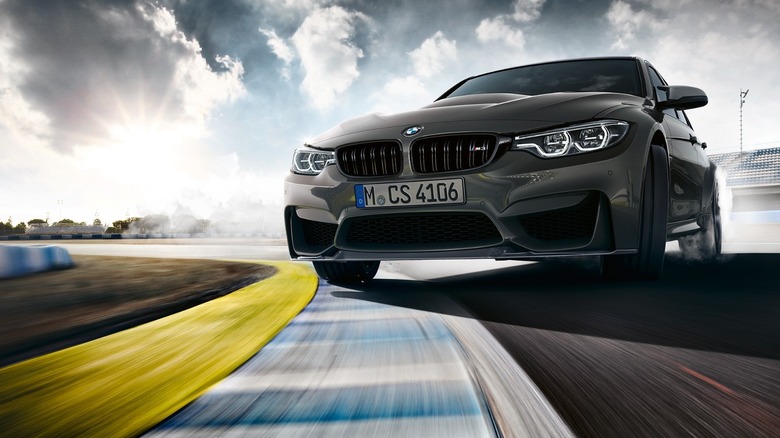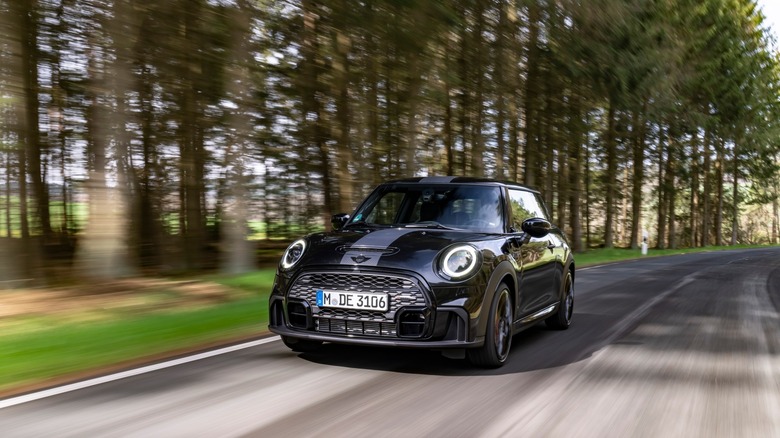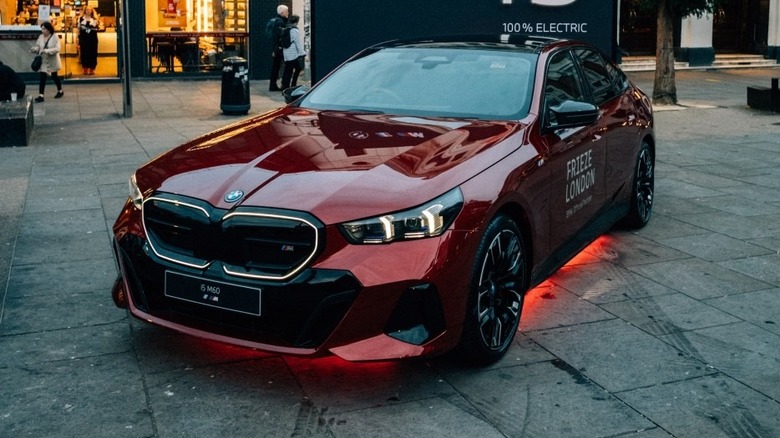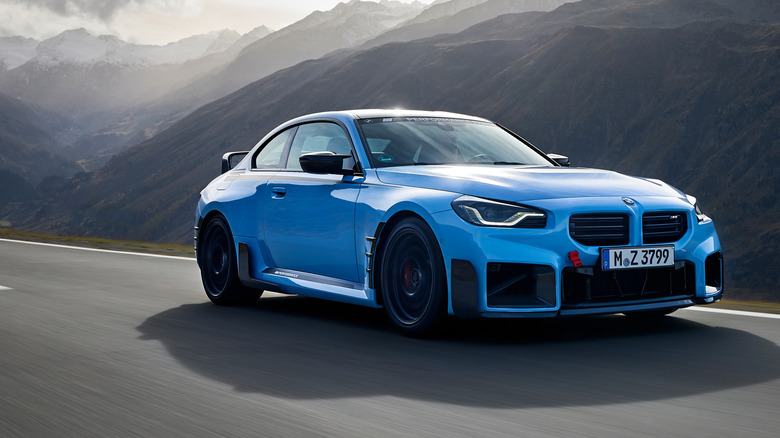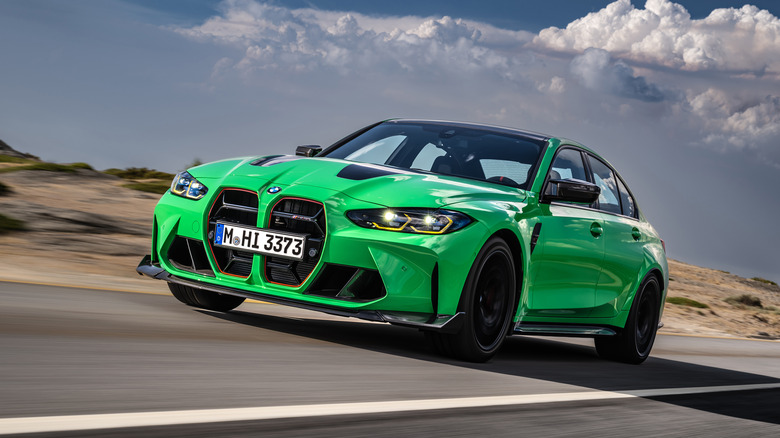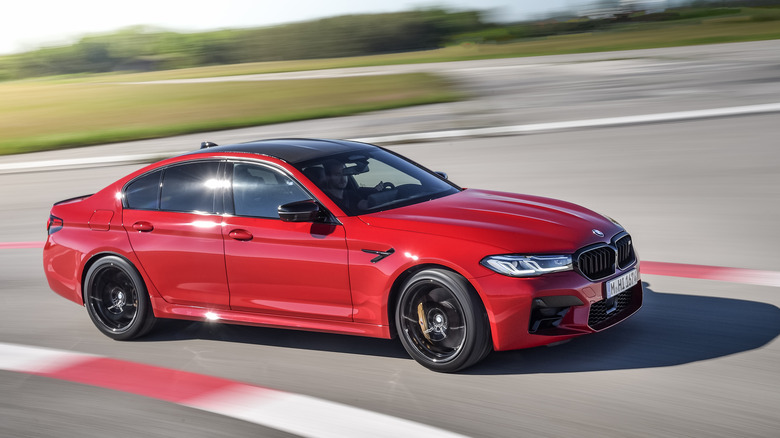The Best BMWs For The Track In 2024
Track days can be fun, but a lot will depend on the vehicle you choose to take to your local circuit. If you're a BMW enthusiast, or you're just looking for a first track car, then you have a few good options available. As could be expected, several of the best options come from the company's "M" or "Motorsport" series — which feature more powerful engines than those in the standard sedans and coupes the company is known for. There are also a couple of options that may be a touch easier on the wallet.
As an added bonus, these vehicles all have some degree of practical use. Their level of practicality didn't affect their place in the rankings, we judged that on track performance alone. But it is nice to know that you can drive all of these cars to and from work, as well as to and from the track.
We spent some time at BMW's test center in South Carolina, and more importantly got track time with each of the vehicles mentioned, to help us make our choices. If you want a BMW for the track in 2024, then these are your best options.
MINI Cooper John Cooper Works
While not strictly a BMW in badge terms, the BMW Group has owned Mini since the 1990s. That means the British Icon is German engineered, and contains a lot of BMW parts. Minis, in general, are just fun cars. The company knows this, hence the idea of marketing it as an agile go-kart for grown-ups. This idea goes beyond the marketing, and that's very much how it performs on a track.
The John Cooper Works edition tends to come with more horsepower, better brakes, and a host of other features that make it an ideal option for anyone who wants to go racing in their Cooper. They also tie into Mini's extensive racing heritage, allowing you to blast a little bit of history around the track — sort of. In terms of raw specs, the Mini is the least powerful on this list: the entry-level two-door has just 228 horsepower. However, it may actually be the most fun to drive.
Couple a manual gearbox with some actual driving ability, and it may also be the most fulfilling option available. There are fewer toys, and there is definitely a steeper learning curve with the Mini Cooper JCW, but it is one of those things that is likely to pay off in the long run. While it is road-legal, and somewhat practical, it's also pretty affordable from under $35k plus destination: that helps make it a very justifiable choice of third car.
BMW i5 M60
BMW introduced the i5 – along with its M package variant, the i5 M60 — in 2023, and the all-electric 5-series was pretty much what you would expect it to be. Less powerful than the BMW i7, true, but lighter and sportier. Many tracks will actually play to an EV's strengths, namely their lightning-quick acceleration. It can shoot from 0-60 in just 3.7 seconds, which you really start to appreciate when you can actually get your foot down. Unfortunately, on public roads other vehicles, traffic laws, and pedestrians mean you rarely get a chance to see a vehicle's limits.
On a track, you just need to worry about barreling into a corner far faster than you should be. This may mean you'll career head first into a tire wall, but at least you won't get points on your license. Despite its extra weight, the i5 M60 also handles exceptionally well, thanks in part to its dual-motor xDrive all-wheel-drive system.
You can have a lot of fun with the i5 on most tracks, though you may want to opt for circuits with more corners and shorter straits. While the 143 mph top speed is more than a lot of ICE cars offer, it still lags behind a lot of the track's top performers by a significant margin. Purists will also miss the sound an engine makes, especially when you're pushing it. And track days are about the experience as much as anything, it's something you need to hear and smell.
BMW M2
The BMW M2 ticks a fair few boxes when it comes to track suitability. The sports coupe is agile, responsive, and boasts a three-liter, six-cylinder, engine capable of churning out 453 horsepower. It's also the most accessible M car, retailing from just over $63,000. It's available with a six-speed manual gearbox, or an eight-speed automatic transmission. While the manual can feel a little more involved, the combination of automatic gearbox and paddle shifters is infinitely quicker and more responsive. BMW recently ditched its dual-clutch systems in favor of a torque converter. While we believe its current crop of automatic Ms is superb, you'll have to buy a slightly older model if a dual-clutch is your preference.
Despite being surprisingly heavy for such a small car, the M2 more than makes up for it in terms of handling. The vehicle has a ridiculous amount of grip in the corners, and if you add in the driver's aids you shouldn't have any issue keeping it on track — even if you're braking a little late. The M2's main issue isn't really its fault: as the "entry-level" M, it's comfortably outperformed by its more potent (and more expensive) brethren at the limit. With that being said, it's arguably the best-looking car of the bunch, especially if you have a soft spot for two-door coupes.
BMW M3 CS
The base M3 alone is an excellent option on the street or on a track. But, if you really want to make the most of those weekend racing sessions, you'll have to stump up for the "Competition Sport" or CS version. The CS is more powerful and notably lighter than the standard M3 — dropping around 110 pounds and gaining 28 horsepower — bringing the total number of ponies under the hood to 453. Torque is also improved, so you shouldn't have much trouble getting that extra power onto the road, and the improvements don't stop there.
MTrack Mode is included as standard — while it requires the M Drive Professional package on lesser vehicles — and you get XDrive too. The latter can be configured in a way that sends more power to the rear wheels, giving a bit of that RWD feeling back.
With regard to downsides and setbacks, the only things we can really flag are the price and availability. BMW has produced a mere 1,200 units globally, with fewer than half of those landing on U.S. soil. Exclusivity aside, there are definitely strong rivals available for less money. With a starting sticker price of just under $120,000, the M3 CS finds itself in a category with a lot of competition — both within the BMW family and outside of it.
BMW M5
The BMW F90 M5 is ridiculously dominant on a track. With a 0-60 time of 2.8 seconds and a top speed of 190 mph (provided the electronic limiter is removed), you won't see much faster in its current price bracket. That power comes from the S63 engine, a 4.4 liter twin-turbo V8. While the M engine alone is enough to set this vehicle apart, rest assured the suspension, brakes, and driver assistance are all on point. You can even tweak the settings, dump the xDrive, and take off in "rear wheel drive mode" if that takes your fancy. There's a wide range of things you can do with the M5, and it's enough car to meet and exceed your needs, while retaining that luxury edge.
While the F90 M5 hovered around the $145,000 mark new, it's possible to get a used one for less than half of that if you look hard enough. It may also be one of the best value track cars on the market, as it can function perfectly well as a family sedan when you aren't pushing it to its limits at your local circuit. While maintenance expenses are likely well above something like a Ford Taurus, it's not the sort of thing you have to take to a track on a trailer — so again, things will more than balance out for your average weekend racer.
The next-generation G90 is still some way out, and will reportedly feature a completely new hybrid powertrain, meaning the F90 could be the end of an era in many ways. However, it's far from outdated and is still very much the best Blimmer you can take to the track in 2024. Especially if you somehow get your hands on the CS edition.
Methodology
Every car on this list is either something that we've either driven around a track ourselves, or rode in while someone a bit more talented takes it for a few laps. We also have road time with many of the vehicles discussed, which allows us to get a better feel for things like comfort, handling, and acceleration in a more laid-back environment. We didn't include more than one variant of the same vehicle (i.e. both the M3 and M3 CS).
Conditions were quite similar for a lot of the on-track tests, as they took place in the same afternoon. The main variable was tire wear, as the vehicles all saw extensive — and generally aggressive — use. Beyond physical testing, we also consider the raw specs of each vehicle, weighted towards on-track performance rather than things like comfort, fuel economy, or all-round practicality.
